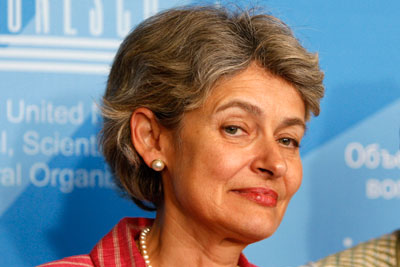News from the Committee to Protect Journalists, June 2010

UNESCO responds to protests
UNESCO’s plan to bestow the Obiang International Prize for Research in the Life Sciences, named for and financed by the most repressive leader of Equatorial Guinea, was met with an outcry from the human rights community. When UNESCO announced they would be bestowing the prize, press freedom organizations – including CPJ – UNESCO/Cano World Press Freedom Prize laureates, and South Africa’s Bishop Desmond Tutu protested. The message got through to Irina Bokova, UNESCO’s director-general: the very credibility of UNESCO was at stake.
This week, Bokova urged UNESCO’s 58-member executive board assembled at the organization’s Paris headquarters to reconsider their decision, saying: “I have heard the voices of the many intellectuals, scientists, journalists, and, of course, governments and parliamentarians who have appealed to me to protect and preserve the prestige of the organization. I have come to you with a strong message of alarm and anxiety.”
Members of the executive board accepted Bokova’s call for further consultations prior to the next executive board meeting in October.
Journalists flee into exile from Iran, East Africa
At least 29 Iranian editors, reporters, and photographers fled into exile over the past 12 months, the highest annual tally from a single country in a decade, a CPJ report released today has found. At the same time, there was a significant spike in the number of journalists fleeing violence and harassment in East Africa, CPJ reported in “An exodus from Iran, East Africa.”
Worldwide, at least 85 journalists fled their home countries over the past 12 months, CPJ found in our survey, which marks World Refugee Day, June 20, and highlights the plight of journalists who are forced to leave their homes in the face of attacks, threats, or the possibility of imprisonment. This year’s total, which counts journalists who went into exile from June 1, 2009, to May 31, 2010, is double the number recorded in the prior 12-month period. The tally is comparable to the decade’s previous high of 82, which CPJ recorded in 2007-2008.
As part of the report, we’ve posted a video profiling Somali cameraman Mohamed Abdifatah Elmi, who, after being kidnapped and held for months, was forced to flee his home country. Also, on the CPJ Blog, Haitian journalist Jean Roland Chery describes his life in exile and Journalist Assistance Program Associate Sheryl Mendez writes about the journey for Iranians from home to exile.
Iran: Worst jailer of journalists
One year after Iran’s disputed presidential election, at least 37 journalists were still behind bars, with an additional 19 detainees free on short-term furloughs, according to CPJ’s June 1 census of journalists jailed in Iran.
Twelve months after the contested June 2009 vote revealed deep domestic schisms and a government determined to silence its critics, Iran has taken tight hold on the dishonorable distinction of being the world’s worst jailer of journalists.
“What began as a crackdown on critical journalism in the aftermath of the disputed June 12 elections has become a more-or-less permanent feature of Iranian society,” said CPJ Executive Director Joel Simon. “With at least 37 journalists in jail and with the media under constant threat, Iranians are considerably less informed today than they were a year ago. We call on the Iranian leadership to reverse this misguided policy, to release imprisoned journalists and allow the once-robust public debate to resume.”
Press freedom suffers in Sri Lanka Victory
When CPJ Asia Program Coordinator Bob Dietz and Deputy Director Robert Mahoney traveled to Sri Lanka in January, one year after the end of that country’s long and bloody civil war, they found that the victory has not eased repression of independent media. Journalists still face violence, harassment, and detention. In their special report released May 19, “In Sri Lanka, no peace dividend for press,” a follow-up to CPJ’s reporting mission, Dietz and Mahoney call on President Mahinda Rajapaksa’s government to renounce anti-press attacks and prosecute the killers of journalists, including the editor Lasantha Wickramatunga.
Kamal Singh Masuta joins CPJ
We’re pleased to announce the creation of a new position with the appointment of Kamal Singh Masuta as CPJ’s deputy editor for innovation. Kamal brings deep experience in both new media and nonprofit work. He comes to us from the American Society for Muslim Advancement/Cordoba Initiative, where he served as new media manager and directed the launch of the Web site Wisemuslimwomen.org. Prior to that, he held a similar position, as Internet and creative services manager, at the Leader to Leader Institute.
As deputy editor, Kamal will take a leading role in expanding CPJ’s digital advocacy, managing CPJ’s Web site and developing long-term plans for growth, coordinating CPJ’s reporting and advocacy with digital presentations, developing online tools to promote CPJ advocacy, and working with all CPJ departments to promote their interests.